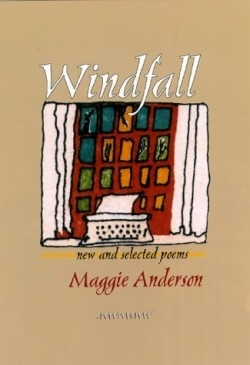Windfall
New and Selected Poems
Some poets spend much of their energy demonstrating how smart and important they are, how much arcane knowledge and how many esoteric skills they possess. Anderson has no patience with such egotism. Her poems are both skillful and knowledgeable, but they carry her accomplishments lightly. ?I never dreamed the afterlife would look so much like Ohio,? one poem begins, and this wry, firmly situated, slightly melancholy voice is typical. Place and people matter to Anderson in deep, even crucial ways, especially the hills of West Virginia and western Pennsylvania. Remembering Pittsburgh from Oregon, she writes with clarity and complexity about “kids recumbent with radios / on the lawns of the robber baron’s mansions” in “the tough, sweet city of the workers.”
This landscape of tattered beauty and proud poverty seems to be Anderson’s psychic home. Her heart is always with those who dwell outside the mansions of power. The heartbreaking “Spitting in the Leaves” reckons the fate of “boys in tight jeans” who will be sent from West Virginia to fight in whatever war comes next, “not because they know what for but because what they know / is how to fight.”
“I’m not going to tell you everything,” Anderson writes at the beginning of “Closed Mill,” and the finely calibrated reticence of that poem is typical of the body of work collected here. Poems must be acts of communication, but these poems demonstrate that the best ones tell as much through the gaps they leave as the spaces they fill with words.
Not a prolific poet, Anderson has produced four books of poems in twenty years of writing, and this “new and selected” offers only nineteen new poems since 1992’s A Space Filled with Moving. Still, Windfall is strong throughout and a fine summation of the poet’s career to date. The new poems are beautifully pithy and inventive, especially the series of “black dog” poems, which includes the hilarious “Black Dog Goes to Art Colony”: “I like it here. I like it here. They do things in packs. / At night they pile together on the floor.” However spare in its language, Anderson’s work is unfailingly generous in its spirit and craft.
Reviewed by
Jeff Gundy
Disclosure: This article is not an endorsement, but a review. The publisher of this book provided free copies of the book to have their book reviewed by a professional reviewer. No fee was paid by the publisher for this review. Foreword Reviews only recommends books that we love. Foreword Magazine, Inc. is disclosing this in accordance with the Federal Trade Commission’s 16 CFR, Part 255.

